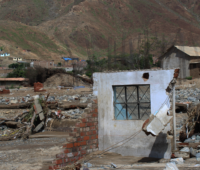In this “Just Environments” essay, Celeste Gagnon, Alicia Boswell, and Patrick Mullins examine the impact of devastating El Niño storms on small, rural communities in the Peruvian Andes. Largely overlooked by the federal government, these communities have relied on grassroots responses to the rains, in effect building new social structures of resilience. As climate change increases the potential for more frequent and intense rains, it is clear that new forms of resilience will become ever more essential to the well-being of these communities.













